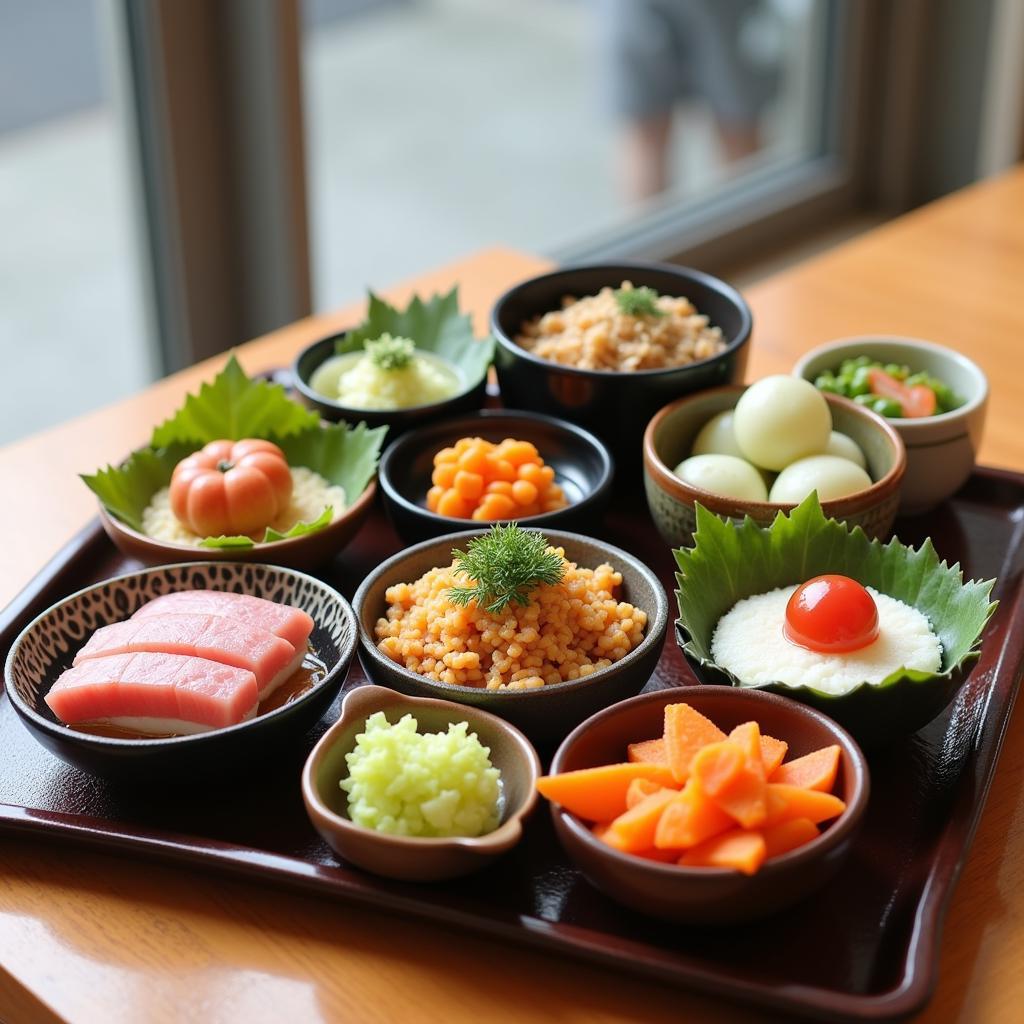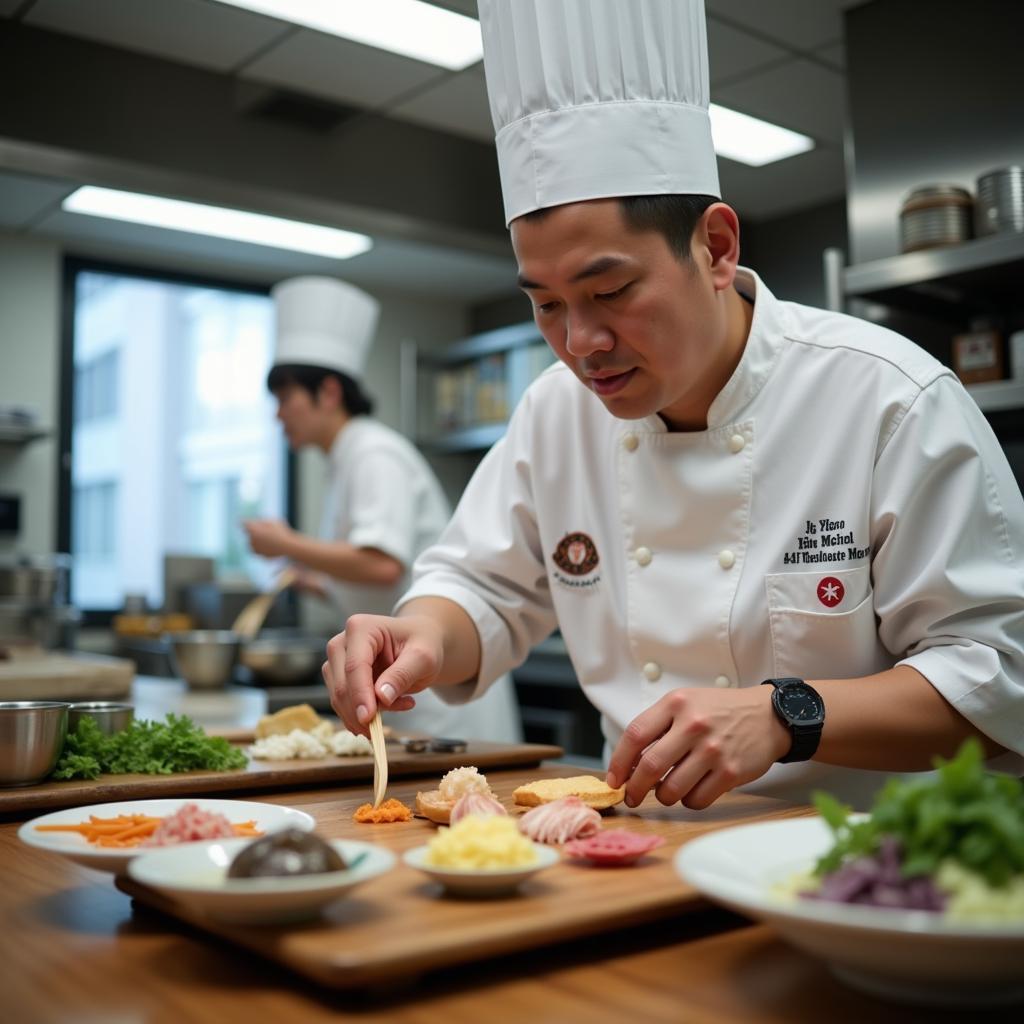Japan Hospital Food often surprises international visitors. While hospital food in some countries might have a less-than-stellar reputation, Japan takes a different approach, focusing on both nutrition and flavor. This dedication to providing appealing and healthy meals is deeply rooted in Japanese culture, where food is seen as essential to well-being and recovery.
 A traditional Japanese hospital meal tray
A traditional Japanese hospital meal tray
What Makes Japan Hospital Food Unique?
Several key factors contribute to the distinctiveness of Japan hospital food:
- Emphasis on Fresh, Seasonal Ingredients: Just like traditional Japanese cuisine, hospital meals often feature fresh, seasonal ingredients. This not only enhances the flavor but also ensures that patients receive optimal nutrition.
- Balance and Variety: Meals are carefully planned to provide a balance of protein, carbohydrates, and healthy fats. A variety of cooking techniques and flavors prevents monotony and makes mealtimes more enjoyable.
- Presentation Matters: Don’t be surprised to find your meal artfully arranged. The visual appeal of food is taken seriously, even in a hospital setting. This attention to detail can make the dining experience more pleasant and encourage patients to eat well.
- Consideration for Dietary Needs: Japanese hospitals are adept at accommodating various dietary needs, whether due to allergies, religious practices, or medical conditions.
 A chef in a hospital kitchen meticulously preparing Japanese cuisine
A chef in a hospital kitchen meticulously preparing Japanese cuisine
Common Dishes in Japan Hospital Food
While menus vary between hospitals and regions, some dishes are commonly found:
- Rice: Rice is a staple in Japanese cuisine and often forms the base of hospital meals.
- Miso Soup: This fermented soybean paste soup is a source of probiotics and often accompanies breakfast, lunch, and dinner.
- Fish: Grilled or steamed fish, often served with a side of rice and vegetables, is a healthy and flavorful option.
- Tofu: As a plant-based protein source, tofu is incorporated into various dishes, from stir-fries to soups.
- Seasonal Vegetables: Depending on the time of year, expect to see a variety of cooked and pickled vegetables accompanying your meals.
The Cultural Significance of Hospital Food in Japan
The attention to detail in Japan hospital food reflects a broader cultural emphasis on food as integral to health and well-being. “Shokuiku,” which translates to “food education,” is a concept deeply ingrained in Japanese society. It emphasizes the importance of a balanced diet and mindful eating habits for overall health. This philosophy extends to hospital settings, where providing appealing and nutritious food is seen as crucial to the recovery process.
Beyond the Basics
- Special Diets: Japanese hospitals are well-equipped to handle various dietary restrictions and requirements.
- Patient Feedback: Many hospitals actively seek patient feedback on their meals to ensure satisfaction and make necessary adjustments.
FAQs about Japan Hospital Food
Is it true that Japan hospital food is actually delicious?
While “delicious” is subjective, many people are pleasantly surprised by the quality and flavor of Japan hospital food compared to other countries.
Can I choose my meals in a Japanese hospital?
Menu choices might be limited, but hospitals often offer alternatives to accommodate dietary restrictions or preferences.
Do I have to pay extra for good hospital food in Japan?
Hospital meals are usually included in the overall cost of medical care.
Experience Japanese Hospitality at San Jose Hospital
While we can’t offer you authentic Japanese hospital food, at hotels near avera mckennan hospital, we strive to provide our guests with the same level of care and attention to detail that Japan is known for. Our commitment to your comfort and well-being extends to every aspect of your stay.